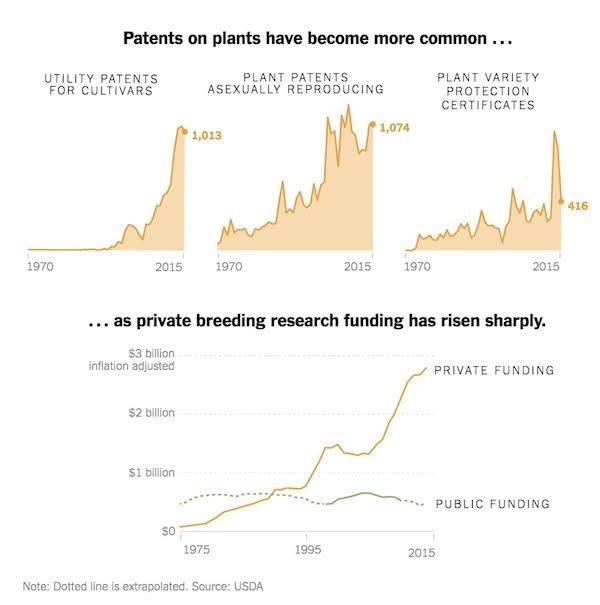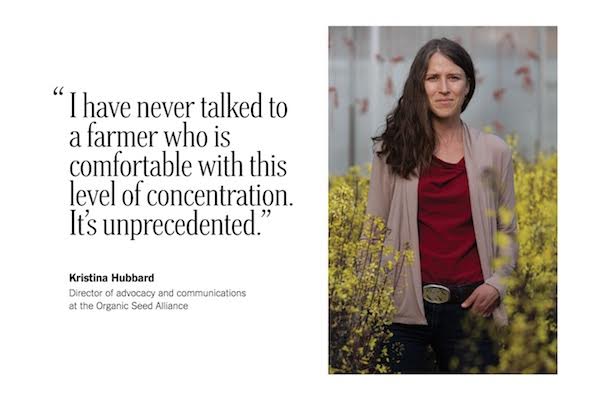Just 50 years ago, some 1,000 small and family-owned seed companies were producing and distributing seeds in the United States but by 2009, there were fewer than 100. From the Big Bang of agriculture around 10,000 B.C. until a hundred or so years ago, farmers saved their seeds to plant for the next season, meaning thousands of varieties evolved across the globe, constantly adapting to their environment and to the preferences of the culture and cuisine.
Nineteenth-century American farmers benefited from this diversity of vegetables, grains and fruits, and it was a good time to be a seed. Not only welcomed but encouraged to stay through a government-backed seed distribution program, free seed allowed farmers to perform trial and error to see what worked, a brilliant idea, except from the perspective of the current seed industry. Obviously, seed that was freely distributed, and freely saved and traded by farmers, stifled privatization and after decades of lobbying, the industry won and Congress ended the program in 1923. Today, there are four multinational agrochemical firms that are estimated to control +60% of global seed sales.
Michelin-star Chef Dan Barber and cofounder of Row 7 Seed Company is hoping to bring back flavor and nutrition to foods by bringing back the genetics that we’ve lost over the years. He looks back to the many weekends he spent at his grandmother’s Blue Hill farm in Great Barrington, Massachusetts as the reason he chose to devote his life to food and becoming a chef. It’s worth mentioning that in 2002 Barber was named one of the Best New Chefs by Food & Wine and has also received several James Beard Foundation awards, including the 2006 award for Best Chef: New York City and the 2009 award for Outstanding Chef. He was also named the top chef in America in 2009 by the James Beard Foundation as well as being named one of the world’s most influential people in Time magazine’s annual Time 100 in 2009.
His personal experience with farms is also what’s inspiring his current venture, where Barber brings together farmers, chefs and seed breeders to find and refine new vegetables that will not only be shelf-stable but also flavorful and nutritious. Barber doesn’t see the problem of seed corporations being too big to fail, rather it’s that they are failing to deliver what growers need to grow and what we want to eat, meaning the kinds of food grown have been reduced to a handful of key crops as crucial biodiversity has eroded. Row 7 offers a path to an expansion of flavors and a widening of choices on a regional level without reliance on pesticides or other chemicals.
Barber and his cofounder Michael Mazourek have been trying to reinvigorate the seed industry with a model hinged on “true seasonality,” as Barber boils it down. Now, Row 7 is expanding its markets with high-end produce like the Badger Flame Beets, squashes named Honeypatch and Koginut, along with a cornucopia of other varieties. The high-end produce is carving out a niche among shoppers who see the ultimate luxury as hyper-local, terroir-driven sustainability. That’s hard to come by at your typical grocery store. Barber’s seed business suggests a revolution in the way food is currently done in the U.S.
Currently, Row 7 relies on a network of 55 breeders who, as Barber describes, have come out of the woodwork to commercialize the kinds of vegetables and grains they adore but haven’t been able to grow. Barber finds that more often than not, these strains are the most flavorful and sustainable of a breeder’s collection even if they didn’t find a home before he arrived. Barber explains this phenomenon from his restaurant, Blue Hill at Stone Barns, which tops many world’s best restaurant lists from its perch on an experimental farm in Tarrytown, New York. He shares that even in the hands of the best farmer, with the best soil, with the best rotations, if the genetics aren’t there to be expressed, then the cake has already been baked, and it’s too late.
Barber thinks that a major obstacle to people eating more vegetables is because they’re made to be a dish’s supportive character as well as that we don’t breed vegetables to be the main actors on our dinner plate, we breed them to be sideshows to the proteins. Twelve years ago, his relationship with Mazourek began when he invited the plant breeder to a meeting and confronted him with the question, why do we need to add maple syrup or brown sugar or something else to make squash taste good? You’re a squash breeder. Why don’t you create a butternut squash that tastes good?
Mazourek was stunned and replied that he’d never been asked to breed anything for flavor. As a chef, Barber remembers that exchange as an extraordinary comment as he was shocked to learn that flavor, a quintessential quest in his fine-dining restaurants, was not a criterion. Through more research, Barber came to understand how big the obstacle was as vegetables are selected for shelf life for long-distance travel and a list of other things that are not what a chef is looking for.
Barber says that even in our system most organic produce is at a disadvantage as organic farmers are growing conventional seeds, meaning seeds that were developed conventionally with chemicals, and one reason why they’re more expensive. Out of this reality, Barber and Mazourek founded Row 7 and to create better crops they ask for feedback from chefs and farmers. They’ll reject any seeds that the disease resistance or agronomic characteristics are not strong as they are not only just looking for flavor, it has to be something scalable to a large number of people.
At the end of the day, Row 7 is offering a path to an expansion of flavors and a widening of choices on a regional level and hoping to close a loop and fix some gaping holes in our food system. According to Barber, if we’re not thinking about seed, we’re missing a huge part of the story, if you change the seed the whole system starts to change. I like the fact that this same model could be used anywhere in the U.S if breeders and Chefs or food companies can come together to make regional changes and offer more opportunities to diversify operations. It will be interesting to see if some of the larger seed companies start to add new channels for greatly improving flavor and overall nutrition and health. (Source: Forbes.com, bershireeagle.com, nytimes.com, wiki.com)








